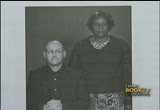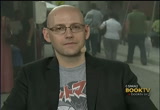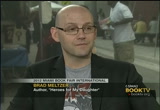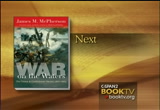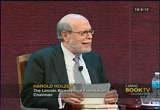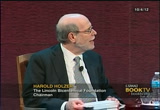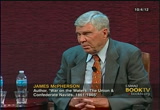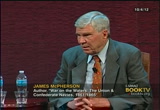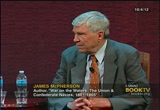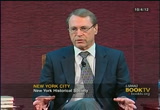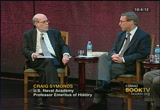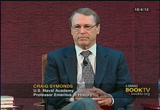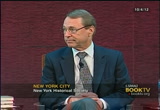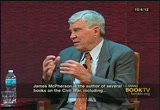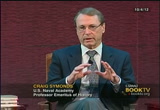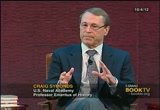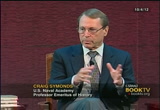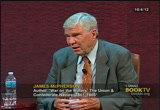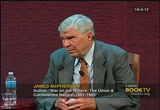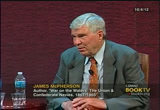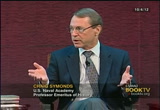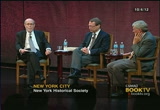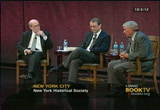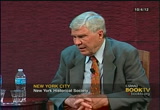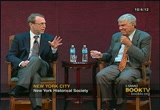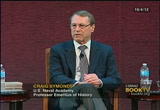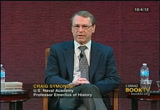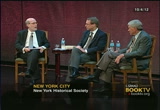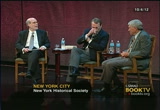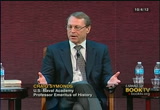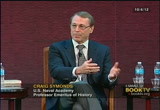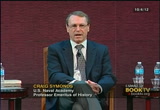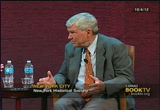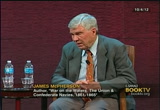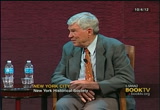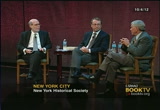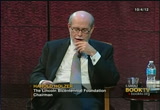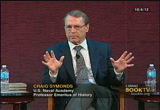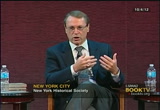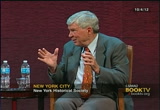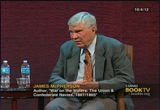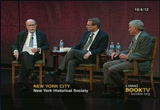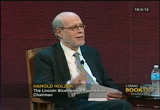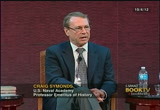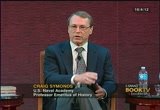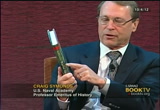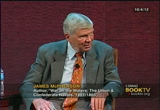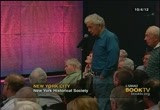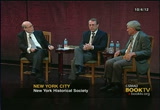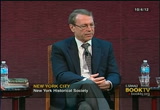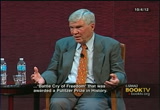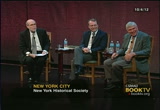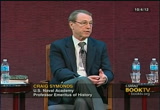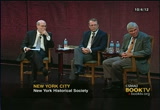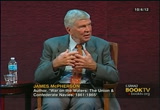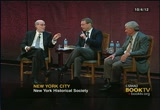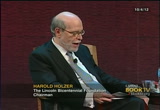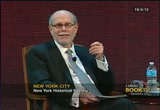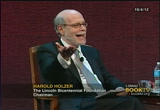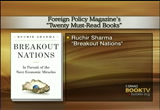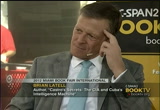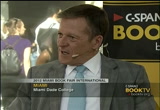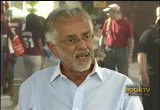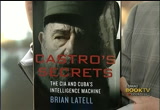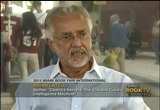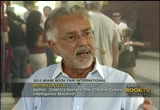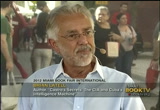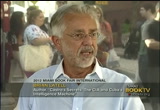tv Book TV CSPAN December 25, 2012 8:45pm-10:00pm EST
8:45 pm
story. here's the end of the story. two summers ago, my teacher,-miles-an-hour spicer, finally did retire, and you better believe i was that retirement party. she actually lasted a dozen years after i first went to see her. so she was going to retire after 12 more years. i weapon the retirement party, and it's a dangerous game when you go to retirement party. if you go, you risk the original memory. i'm like, what if she is not as inspire organize great as i thought? and as i'm hiding to surprise her, and she gets up there and it's a roomful of jaded teachers. it's a retirement party for a public school teacher of english and all she had to do is say, i lake have half of you, i hail the other half. but she gets up and says and looks at the crowd of people and says, you know what? for those of you who complained that it's hard are now, who think the kids are harder now,
8:46 pm
you've all gone soft. you're all complaining too much. do not give up on these kids. do not give up on these kids. and she gave a rallying speech like it was the final scene of brave heart. i almost ripped open my shirt to join her. and i thought, he is so inspiering, on the day of her retirement. and i realized i well forever, forever be her student. so so, miss spicer, if you're watching, i love you. >> host: that's a rather formidable picture. >> guest: this was actually taken -- i told that story and the school board asked me to honor my favorite teacher, and i picked her. and they asked to take a picture together, and the best part of the picture is she looks so stern, and i you are on her bad side you'll get hit in the head with an eraser. but she is the sweetest, nicest woman, and i say this for all the teachers who are everyday
8:47 pm
heroes. think of the person who gave you your first start. so many times people say,id brad, gave your book to my son's teacher, my daughter's teacher, and so many teacher that heros and miss spiceries one of the nicest people in the world, not as mean as that picture. >> host: we're talking to brad meltzer. as we take this call from terry in brooklyn. hi, terry. >> great show today. brad, you look into things that people take for granted and turn out not to be truism was raised a straight catholic. catholic school, altar boy, and i pretty much believed everything they taught me as far as religion and jesus christ but i was into reading and i liked to read and started getting into history and i discovered a lot of real history didn't reconcile with the bible. so the question is, i discovered a series of books that mentions -- suggests perhaps that there really was no jesus
8:48 pm
christ, in the historical record, actually starts almost two centuries after this character appeared, and it could possibly be something that was -- i mean, that invention, but how do you address the fact that, for 200 years or so, before there was writing about this, nothing appears no letters from anybody no graffiti, no correspondence between ain't spent people and why does ever
8:49 pm
when we put this book together i left out all religious figures. i don't want it to be a battle over religion. so much good and bad can come out of religion. but i think it's amazing how much we can agree on, and i felt like i didn't want to put out there something that people could consecutive agree on, so there's no politics, religion, my dodd is better than your god. heroes for my daughter was never to be about that. it was to be about what can all agree on and there are some things that are inarguable, like whether it's your english teacher or your mother, but picking people like rosa parks and that we know and can see. things i found usefully. whatever your religion, we can all agree on. and that's what wanted it to be about. >> host: that's the last word. here again is the cover of brad meltzer's most recent nonfiction, "heroes four my daughter." his information thriller comes out in january of 2013.
8:50 pm
thank you for joining us here in miami. >> james mcpherson presents a history of the universe naval forces during the civil war, now on booktv. mr. mcpherson reports on the impact that each nave where made during the war, from union naval support of numerous battles, including vicksburg and new orleans to the confederate use of naval mines and the deployment of a submarine. it's a little under an hour. [applause] >> good evening, everyone.
8:51 pm
last time we met here on this very stage, to talk about the story of the civil war at sea and on the rivers, jim, you were putting the finishing touches on your new book. craig, you were preparing four book for publication as well, and now both dish have to do this the way they do on the talk shows -- so, now, james mcpherson's war on the waters, the union and confederate navies, 1861 to 1865, and craig's civil war at sea, both very handsomely done, and it's good because we get to resume our conversation. we barely broke the surface. let's get right to it. because we spoke for an hour last time and we got to about january of 1862. so i'll assume you all know about 1861. and get to something that jim
8:52 pm
pointed out in his book, which i found rather interesting, and that is that 150 years ago this month, eye side from all the other things going on, including the first shudders of the realization that lincoln had actually promulgated an emancipation proclaimation. the blockade was in force in confederate ports. the union had chanced the bombardment of the city of vicksburg, and new orleans had fallen. the tennessee, cumberland, and mississippi rivers seem to belong the north, not the south. and it must have seemed for a time in 1862 that this combination of events, particularly the naval successes for the union, were about to end the war between the states. and then the trend line changed. the father of water that lincoln boasted now flowed unvexed to the sea, became vexed all over again. so jim, let's start with you. what happened and why?
8:53 pm
>> well, the union navy was on a roll in the fall and winter of '61 and '62 and the spring of 1862. and it looked like they were going to open up the mississippi river completely in the summer of 1862. vicksburg was really the only confederate bastion still on the mississippi river, and both the sea-going fleet under, now-admiral david farrogot came up from the gulf of mexico to vicksburg and the so-called we were flotilla of river boats fought down the mississippi, capturing memphis on the way and a number of other places as well, and they combined to bombard vicksburg, but it was clear that the city could not -- the batteries could not be taken without the support of army troops.
8:54 pm
and general hellic, who was the army commander in that teeter -- i like to call him general "can't be done." tells farrogot if he could ferry his troops to help -- to capture vicksburg, and hellic said, can't be done. don't have enough troops. the level of the river was dropping so much, the union naval forces and the army troops that were there, only 3,000 of them were all getting sick, some dying from sickness. so the union forces actually gave up the effort to capture vicksburg in the summer of 1862 because the navy alone couldn't do it. which came as something of surprise in the northern public because until that time the navy had been doing a lot of things
8:55 pm
all by itself without any army support. they'd captured hatteras in august of 1861. captured the bay in november of 1861, and the fleet captured new orleans, all without any army support at all. but clearly that run of success was going to come to an end. the confederates had now figured out some way to carry the war to the union forces. they had built an iron clad named the arkansas up the river in mississippi and it came down all by itself and attacked the union fleet in july of 1862. the confederates had gotten two raider, the florida and the alabama, built in britain, and they were being loosed on the seas now in the summer and fall of 1862. the union navy had captured
8:56 pm
galveston in october 1862 but the confederates counter-taked on new year's day and drove them out. so the momentum of the war had seemed to be reversed. and it took awhile before it would swing back in the union favor again. >> craig, jim mentioned haleck's reluctance to involve himself. walk house the development of the understanding of the urgent need for joint operations? >> i was just going to say the broader question behind this is the fact there was no protocol no understanding, and very little experience in the history of the united states that would allow the navy and the army to work as partners on a single team. we have to remember that the national security act of 1947 is a post-world war ii phenomenon that create third joint chiefs of staff, secretary of defense. during the civil war, and in fact during world war ii there was a secretary of war who was
8:57 pm
responsible for the army and secretary of the navy, obviously responsible for the navy, who sat as coequals at the cabinet table, and they were members of a coalition perhaps. they were on the same side without a doubt. but they were hardly partners. and that became very clear early on. not only with haleck, "general can't be done" jealous of his own command. wanted to keep the forces under his own control, which he believed was essential to capture the railroad hub, and the navy whereas equally jealous of partnering with he army. they didn't want to do it. secretary of the navy, gideon wells, was actually determined whenever possible that the navy should do things without helping the army. wasn't that they could do it without the army. they routey sought to do it without the army, and that was a good thing because they got the headlines. so, behind all of this difficulty that begins to emerge now late in '62, there's an underpinning of jealousy,
8:58 pm
competition, rivalry, between the union army and the union navy. >> who outranks who? does the captain of the navy outrank a captain of the army? >> in that particular case, yes. but again, taken most broadly -- let me page a couple of points. one is that the army had lots of generals and the navy had no admirals. the nave is going to get some. he's coming. farrogat will be the first but there was a notion that while armies were there to protect home and hearth and protect the constitution, navies were instruments of empire. the royal navy would come over and blockade our showers. the navies were to be looked at with some suspicion. and in particular, fleets of ships, which we had very few, and no admirals at all. so the highest rank you could have in the united states navy was navy captain. there was an honorary title of
8:59 pm
commodore, and the equivalent see is an army colonel. so an army colonel and navy captain were coequal in position. but that division between army and navy meant they couldn't give orders to each other. i often told my students at the naval academy, do you realize during the civil war the highest ranking general in the army could not give an order to a seaman recruit anyway they said, sir that's correct they way it ought to be. so that's a problem. so who is in charge? nobody is in charge. the commander in chief ultimately. >> the commander in chief is in charge but he is thousands of miles away in washington, dc. >> but it could work when the army commander and the naval commander of a particular operation cooperated with each other, and that became true with
9:01 pm
in 1862 they were at odds worrying about grant getting too much credit. give a sense of the state of the navy in terms of ships and men as 1861 to 1862. things were changing dramatically in terms of enlistment. >> one of the things about the civil war and it's particularly true of the navy is it six kind of on a technological point in american history things had been changing for some time. the power comes in and the railroads already expanding across the continent but the application of the large-scale warfare in the civil war is one of the first cases where we see that. now the land war probably arguably at least is the most immediate impact was the shoulder muskett which dramatically extended their range the soldiers could fight
9:02 pm
and at sea there are a number of similarly important technological changes. obviously there is steam that had been around for a generation or more with the application, the universal both on the blockade and those attempting to run the blockade rifled guns just as muskets in the field armies and the artillery extended their range and accuracy thereby hiding elevating the impact of the war ships over the guns ashore going into the civil war. the general motion was turned guns ashore are going to defeat them afloat every time mainly because they don't sink. but with the new rifle ordinance and explosive shells changes the balance of that and the one that everybody recalls is the ship farmer coming and we talked a little bit last time i think about the famous battle between
9:03 pm
the ironclad and even the emergence, as a technologically there is all of this going on but also you mentioned manpower. the size of the navy. we used to talk about the civil war in the 16,000 men army that extends to the numbers to plead for million let's say the union navy began and the confederacy began the purposes with non-so both are dramatically expanding the size and that means bringing more people and that has an impact on the character of manpower racially integrated in the military force and the reason for that is obvious. it's hard to segregate on the border of the ship. it's very grounded. it's hard to have an all black shirt and white ship as for example the black-and-white regiments in the army. so that was a tradition that had always been there, but the
9:04 pm
numbers changed dramatically. they'd gone up to 15% by about 1830 and then the pressure of the representatives in congress that said they should not allow them to serve drought that down close to single-digit and then they dramatically jumped back up again to probably a little over 20% so all these changes are taking place. >> i might add that the confederate also were very savvy with technological innovations. they made a decision, confederates made a decision early in the war that they are not free to be able to match the navy and the ships and the manpower so they are going to have to try to substitute quality for quantity and so with a pioneer in the building of the first ironclad warship and as the wooden steam in the 1850's and before the confederates captured it. but they also pioneered with the
9:05 pm
development of what were called torpedoes. we call them naval mines today, and this became probably the most effective confederate naval within of the war. compared to the naval mines today they did manage to sink or destroy 43 union naval warships during the course of the war triet more spectacularly i oppose when they attacked the day on august 50th 1 of the ships was in the ironclad and stated the argument in 1864 that they had struck one of these torpedoes and went down with a loss of 90 men. and the confederates also built or bought and had written a number of very fast well armed ships again most famous in south
9:06 pm
florida and alabama brought havoc with the american merchant marine during the course of the war. i believe the number of ships that they sank or captured, american merchant ships 12 consider it somewhere in the neighborhood of 254 in the course of the war and alabama alone sing or captured 64 american ships, so the confederates, even though they were never by the end of the war something like 110,000 men had served in the united states navy, the union navy. the confederates had a total of about 5,000 so they are never more than 5 percent of the strength of the union navy, they were able to have a lot with that shoestring operation and i would have gone to that for just a minute i think that's an important point especially following up on your question
9:07 pm
about manpower it's important to remember that in the 19th century the navy is a world over not just american navies but the navy as a world over would take any person on board, anybody that could do what he was told was perfectly willing to be accepted into the ship's company. so that john paul jones for example during the revolution had on board a couple of americans but also irishman, scots and spaniards and africans and chinese and everything and so that was kind of the template but it was particularly true with a half-dozen or so would meet them in some islands somewhere in the bahamas and they would convert this stuff and the anguish shipyard and then invite everyone on board to join. some of the british men that had brought it out said it sounds pretty good, prize money and so on. a lot of them said no so they would scrounge together what they could so of the 5,000 that
9:08 pm
served in the confederate a lot of them had never been in the confederate, never saw the confederacy in their lives and so it was even smaller than that. >> you've written in your book something i confess i haven't thought about which is as much as we know that the army particularly the union army had the accent in many regiments there were others on board the ships as well on balance. estimate that is the story the both of you tell. i want to go from the manpower, the enlisted personnel to the people in charge for a moment, and this is something i find fascinating. i know little about ships. remember jefferson davis with a west point man who prided himself on his calvary
9:09 pm
experience and military knowledge rated each of them quickly but ask you to do it in two points, beat each of the commanders in chief of the navy. what they knew in april of '61 and how they ended it. what was their experience, and what was their accomplishment in this front? >> i would say that both of them were successful in the sense that they left their secretary of the navy alone and both secretaries of the navy were really quite effective even though neither one of them had significant prior experience in running the navy. >> she was the lawyer from florida. he had actually been a lawyer for the companies at key west that went out and salvaged the rex many of them. >> he was the chairman of the
9:10 pm
committee in the 1850's, so he did have some prior experience. but i think it was due primarily to mallory that the confederates chose this option of the technological innovation. but i think lincoln and davis both had the good sense to recognize the ability of the navy department's and to let the secretaries run it. lincoln didn't have to spend anywhere near the amount of time dealing with the navy that he did with the army because the squeaky wheel gets the grease. and in the case of the union was the army, the navy was wheeled and efficient from the beginning. lincoln also had the good sense to recognize the fox as a can-do. they become assistant secretary of the navy and although he was one of these people who didn't want the army to get any of the
9:11 pm
credit for the navy and let the army ruin it they said we want to take charleston on bye ourselves which of course they never did. but fox was a go get kind of guy and he recognized that and became the equivalent of what we would call the chief of the naval operations today. and lincoln actually twisted some strange and twisted some wires to get him appointed to that position which hadn't existed before in the united states government assistant secretary of the navy. >> but they were called the dutch clerk for years but the idea of having an assistant secretary would be the point of that? does nothing for them to do and the job of the chief clerk had already been promised elsewhere and lincoln was told -- >> your assessment of the commanders of chief, naval commanders in chief. >> i agree that both secretaries of the navy were very competent
9:12 pm
and i would disagree that they had little experience. i think being a lawyer in key west and then the chairman of the senate naval affairs committee is a lot of experience for steven mallory come and gideon welles had more experience of people getting credit because he was the navy at the time is administered by a series of bureau personnel and navigations in engineering. he was the bureau of clothing and provisions, which means he was a logistics guy for the navy the only civilian to have that job and everybody else was a navy capt. would be like having somebody on the joint chiefs of staff so he really did have some experience with that. there was a tendency on the part of the officers to downplay that so it wasn't important. he was probably the most scathing and said yes i heard about our new secretary. there is a rumor that he made an extraordinary contract. this is all that he could possibly do. but that experience did allow
9:13 pm
them to be as effective. >> good choice by lincoln. he could have appointed -- and of course what is interesting we didn't know he was with to be the navy secretary. he had been -- he thought he was greeted the postmaster general. navy department, okay, fine. back to your original question. i think that in general, lincoln had a greater ability to adjust to changing circumstances. he was a more creative person. jim is right if he could recognize people with talent and make sure that they had gotten in the positions they could make a contribution he didn't interfere with the navy as he did in the army but he did have favorites in the leadership. jefferson davis i think was more in a rut and existed in the protocol to be followed and constitutional requirements suggest i must do it this way
9:14 pm
and he knew that he could win or lose the war on the land in a day but that wasn't true. so he didn't let steven mallory do it and one last thing if there is a criticism of him and maybe it's not, media is a positive thing he was determined to lay the groundwork for the permanent confederate states in many become so heated things during the war not just to achieve the immediate objective of what we need to do today and next week to advance the confederate cause but how can i lay the groundwork foundation of the naval infrastructure for the next 50 years like the naval academy for example which he founded and which probably was not necessary? >> reading of your books, but i of learned i think in the subject is that the this was surprisingly whether through channels through mabry or not was free-wheeling but the green lighting technology innovation. he got to the production of the ships in a remarkably quick
9:15 pm
time. when you say he went from zero to 50 in a very short time -- >> i would say he didn't get in the way. >> not a bad thing. and lincoln sort of like it. whenever he got on the river ship, he liked the ordinance, he liked the innovation, and he looked out the day she said i think there is something when he was shown the design of the u.s.s. monitor because didn't get a ride in the nick of time to create the most famous naval engagement of the war? but i want to go beyond that because we have spent time in our time here at the historical society talking about that epic battle, that epic duel 150 years ago. but, he famously said it was the end of the wooden navy and the walls would fall after that, and then the guy that both of you right so much about in your books, and i think you both like
9:16 pm
camelot, not young or glamorous in his adventures. tell me what impresses you the most about the surrogate and then each of you has to tell me whether she really said it or he didn't say it. [laughter] >> the thing about surrogate, there are several things and i will start with a whole question of loyalty. one of the problems in 1861 when the war began as the officers enlisted them for that matter but in particular they had to decide whether loyalty laid. whether it was with the state or the national government and one clear difference in the navy and i will take the opportunity for will pull get the army for this is that with the army most officers went with their states. most people are aware of that famous internal debate that
9:17 pm
robert e. lee supposedly had in the group steps at the wing that he thought all my about what he should do. the navy, not so much. the southern bourn naval officers more than half just barely but just over half actually stayed with the national government. even though they were suffering borne. now you could say that this is obviously because the naval academy understands more about loyalty than they do at west point. >> most of these guys didn't go to the naval academy. >> it was created in 1845 so the senior officers had come up the old fashioned way, the midshipmen in the yard but they but say an officer with some experience looking for an opportunity to command the ship was a the confederacy doesn't have any ships. so maybe my opportunities are great. whatever the reason might be. but sarah get was one of those guys. he of course was a southern born southern raised and born in tennessee and raised mostly in
9:18 pm
new orleans and lived in virginia and was married to a woman named virginia from virginia, and yet when the news came that virginia had passed an ordinance of secession and and then came home and announced i will not spend one night in a state that is so dishonorable. i am leaving come with me or not. >> did he save them? >> well, i'm lucky my wife has heard me say this before. the words i used in the book seem to me to be the most likely ones that he was sexually speaking to the captain of the ship alongside its full speed ahead so it wasn't quite what has come down in history damn the torpedoes full speed ahead with the sense was pretty much that and the question i always ask my students is whether or not he might have said the
9:19 pm
torpedoes! [laughter] we will never know. [laughter] >> as i quote in the book, there was a marine to come back on the look ahead of the hartford and stopped and the whole fleet came to a stop under the guns of fort morgan and that's when they ordered them to go ahead and the rest of the ships followed and they got through. the marine that was standing there said he didn't hear him say any such thing but i have always thought the important thing is and what he said, but what he did. he did order them to go ahead. whether he said damn the torpedoes full speed ahead or not, he didn't. you are asking about the
9:20 pm
qualities of some of these people i think he could have said as he said about grant i can't spare this man, he fights. he was the most fighting admiral in the navy during the civil war. and he proved it over and over again, but i think most notably in the run-up to the attack in new orleans in april of 1962, most of his captains, the ship captains and the fleet didn't want to make that attempt. he actually called the council of war with the captains on april 22nd, 2 nights before they went, and most of them said it is too risky. they haven't knocked out the guns in the ports.
9:21 pm
we are going to be sunk and when we pass the ports, and he said we are going to go. and he also said i believe and celerity. if lincoln had more commanders that believed, then more would have been one in 1862 and he proved this over and over again he passed for hudson and five of the seven ships didn't get by. one of them was sunk the to the day to get by including the hartford were able to interdict the confederate shipments on the mississippi river and its byrd and that played an essential role in the capture of the fort and vicksburg and then of course famously he damn the torpedoes on august 5th, 1864. so, that is the quality that i think was most.
9:22 pm
loyalty, courage. >> i don't tell the story but i do to live in my book because there was a point i think in 1863 when he brought hartford back from recess to new york and there was a big political rally going on. they were on the stage, and lincoln was concerned particularly from george mcclellan in the 1864 campaign he was uncertain about how these other generals and add morals might react, and he was there but sort of pushed up on to the stage and he said i have no speech to get i will do my job in the water and you will do your job here. i have no political interest and he left the stage. that characteristic was valuable to lincoln as well. >> back to loyalty. >> he was the grant of the needy. >> i ask if anyone would ascribe that. what astounds me because i am afraid of ships and said he was
9:23 pm
in his thirties. this guy was in his 60s. that's a tough service and demanding coming yet he managed to be heroic and it gives us all hope. [laughter] would highlight the most i'm going to ask a few more questions but i also going to ask if you have questions this would be a good time for you to line up liking on either side of the ottilie and i see a few of that will turn to you, but while you are waiting i want to ask you both mentioned african-americans in service and you both mentioned the union taxation on recapturing charleston which was so symbolically important and yet such a difficult part were to get because it's surrounded by forests, but i want you to talk both of you if you would about robert smalls a story that isn't
9:24 pm
often is a man that comes into the view on the planter tell me what that story was. >> one human established on the south went to coast be enslaved americans recognize this was a potential consolidation and thousands of them came down to the coast line or the reverse when the union's ventured up the rivers and flagged them down and asked to be taken on board and protected and so forth, so one of the things that needed is have a series of camps on those islands with some of the earliest schools in the south so it wasn't unusual that the africans -- african-americans would come down and ask to be taken off and that is one of the reasons why the number of blacks serving in the navy increased but what happened was something
9:25 pm
altogether different. there was a small boat used by the confederates to bring supply information and messages back-and-forth among the various ports in charleston harbor, fort sumter obviously the famous one but also toward johnson and the battery and the small boat called the planter would navigate among them and at night the white officers in charge would go home and sleep in their beds and leave it in charge and was robert smalls and he watched his behavior and activity and memorized the signals he's all given back-and-forth between the ports and he informed the crew but he was going to do and told them surreptitiously bring our families on board and about 2:30 come 3:00 at night he got up steam and went checking out of the harvard and gave the recognition signal the end of the said all right, carry on and as he went out to the union as the sun is coming up, here comes
9:26 pm
this confederate ship that they recognize as the planter coming out, and everybody is flying a big white flag or the coming out to surrender, but it was bringing the ship, the crew and their families to freedom. >> also the guns. >> that's right. and it proved to be a valuable source of information. one of the things the african-americans came down and volunteered for service was to pile that many of those rivers to bring information about what was going on the shore. they were kind of the secret supply rain of the union. >> he became a pilot for the union navy and so did a number of the of their sleeves that had escaped from charleston just a few days before he came out. 15, they were called contrabands , slaves decided they wanted to make their way out of freedom and general croswell
9:27 pm
rule out to the union fleet and all 15 of these guys were knowledgeable about the waterways on charleston and they became valuable in the union fleet. i argue in my book that the navy really deserves in some ways more credit than the army for taking the first steps towards achieving freedom for the sleeves in the civil war. and in the early months of the war they penetrated deeply into the confederate territory along the south atlantic coast and the mississippi river and the tennessee river and the far more areas where the slaves lived in the army. we talk about the liberation and it became an army we talk about the slaves recognizing the union army as an army of liberation long before the army itself did in coming into the union lines. but in fact, the early part of
9:28 pm
the war i think more slaves were coming to these ships. >> they were operating in the estuaries of the saw the atlantic coast and the gulf coast and of course the reverse. when dupont's fleet captured the day and then spread out to capture all of the south carolina, georgia and florida and a number of other ports, brunswick, st. augustine and so on the theory that tens of thousands of slaves. it wasn't the army that did. >> that is a good point to make in the emancipation proclamation of a couple of weeks and before we go to the questions just noting that here we are proud that new york state was smart
9:29 pm
enough to request and preserve the emancipation proclamation and send it this year on a statewide tour. chicago didn't do as well with the emancipation but they couldn't help it. but we did very well saving hours. the emancipation proclamation was associated with the navy was any five-year of its own rescued from the new york state capitol fire of 9/11 that occurred only a few days after the triangle so almost no one paid attention to it that the emancipation proclamation might have perished. it's a safe and secure. the legislature for whom we raise did its job in 1865. >> tell us who you are. >> i am a game designer. there's also some self of the
9:30 pm
mason-dixon and i wondered if each one of you could take the edge admiral buchanan and the federal it may be on the mississippi first fleet to defend new orleans and then to defend memphis but if you would talk a little bit about the senior command of the confederate navy. >> buchanan was an old sea dog that joined the navy during the war of 1812. that wasn't unusual. he was still a teenager and that was pretty much difficult for the were found that he would join as a teenager and learn on the job, so she had been a naval officer for almost half a century by the time the civil war that broke out and we were talking about loyalty. here is a border state individually born in baltimore
9:31 pm
actually, but he grew up in pennsylvania which is clearly a northern state. his wife was from the eastern shore of maryland which is a very pro southern slave oriented economic culture so he did struggle the two sides and he was conflicted about what to do in terms of his loyalty. in 1861 there was a riot in the streets of baltimore said on the baltimore massacre. he assumed maryland was going to succeed so he said that's it i'm going with my state submitted as a resignation and then of course maryland didn't succeed and they get back to the secretary as a change my mind i would like my commission back because this is one of the senior men in the entire navy and he said if you didn't think enough to stay in the time of trial, we don't want to, you are kicked out.
9:32 pm
he became the commander that fought in that battle where he is wounded and it takes a year and have to recover and when he finally does he sent to mobile with another ironclad in tennessee and he is the guy that he was going after when he did or did not say damn the torpedoes. so old dhaka -- >> it's brushing against -- >> that particular drawing that is the tendency. when you buy this book, and you all should, you will see here is the csis and buchanan is inside that and in fact on board the hartford, is it brayton that says he recognized buchanan? well, what are the chances of that. and he got so infuriated he
9:33 pm
through his binoculars at them. >> that's what we see right here. as the the cannon was in the right place at the right time for the two of the most noteworthy particularly ironclad in the navy but he was in my mind a kind of throw back. as i say come he was conflicted about loyalty but he wasn't consulted about the rules of the sea and his idea was celerity to it he wanted to go straight out, fight it out and made the best man win but he survived the war and became the president of the university of maryland says he's the only person to be superintendent of the naval academy of which he was first in the university of maryland died of old age and now you don't have to buy the book. [laughter] >> he wanted to know about montgomery. >> i will be very brief about that. he built up a river descents
9:34 pm
fleet who basically they were converted boats commanded buy basically steam boat captains and a civilian volunteer crews. they were responsible for helping them in st. philip's and jackson stop the fleet but neither the parts of the confederate fleets stopped them in that defense sweep they were sunk in by the union navy and moved up past the parts and captured and new orleans. then montgomery moved up with to take command of i think eight upper supposed to defend memphis in the confrontation with the western on june 6, 1862 including some unions that were yclept. they had reinforced and the idea
9:35 pm
is they would ram the enemy. the union had some of its own in the interesting command with no time to go into that. but the upshot of what happened in manteca memphis june 6, 1862 is seven out of eight of the confederate ships were sunk and were captured in that conflict, too said montgomery as you said in his defense of the mississippi river has two different union fleets. spikelets what this gentleman here. >> my name is mark. i'm a member of the society here. i would like to ask a question about something i've always been curious about. and that's the relationship between the captain and ulysses grant in connection with fort henry and fort donelson. the victory is really kick started his career and there are no to words about it. which was a pretty important event in his career and in
9:36 pm
military history of the united states. but when grant originally went to propose the idea, he practically threw them out of the office. he really be little demand told them his job was to take orders and not plan the strategy until now. and from what i have read, grant was able to turn this around because he persuaded a foot of his ideas and then he wrote a letter supporting this what seemed to me that he was really sticking his neck out and said you know, there's a lot of hostility to the joint operations and he was sidestepping the military protocol. let's hear the contributions. >> i will say a few things and then let him take it up. he was very senior in the -- he was around for very long time
9:37 pm
coming and he had a difficult to cooperate with the army in the last. it's largely because of him that the navy creates this sort of hermaphrodite title of flag officers like a major general you are not really an admiral ordered general but we are going to call you an officer and say that you are like to stars so that you can have a conversation with the two star general. this is the highest-ranking available in the army and relative ease in terms. so that gave him a bit of leverage in dealing with people and it's also true that he recognized that synergy working together than simply side by side with create a greater force so you are right in crediting him with a lot of the opportunity that allowed a grant to carry out this program that he sought and he had been rejected by the general that can't be done.
9:38 pm
something i haven't mentioned yet but that is relevant is in that time in the winter and spring of 1862, their river union navy was under the war department and the initial idea was that the operations in the interior country should be under the army to the end of that created a somewhat awkward and confusing situation. and i think that probably the greatest credit should be his ability to navigate this very awkward situation and to work with grant and to work with the master general in charge of actually constructing the ships for the river navy, but he was the man on the front lines out there on the construction of the
9:39 pm
so-called turtles. they were ironclad belts, shallow drafted they drew 6 feet of water that were in some ways the most innovative naval weapon in the theater in the war and deutsch got a situation where the navy in the summer of 60 to the congress brought it entirely under the navy department but without foot, i don't think that that would have -- maybe this is the wrong expression that wouldn't have gotten off the ground. estimate he navigated. >> served as an officer for several years during the war. there were five aboard the ship
9:40 pm
and i realized i knew very little about the history serving in the navy. what happened to them after the civil war because it seems when you talk about the early history they were integrated and served in our capacities. so can you give a quick rundown? >> what happened to the quality to their ability to serve? how did the navy use them until recent times when they went to annapolis. >> this is one of the tragedies and of course there are many. we tend to think of it as a loss of life that made it look tragedy that much of it was in vain because during the part of every construction and the real solution of jim crow and the establishment of the jim crow segregation and the navy with and the rest of the american society became subject to that as well so that in the late 19th
9:41 pm
century the idea we will take anybody that can pull the rope went away and the crew of the united states navy ships were right and then it became a statutory that they could only serve and later apply the filipinos as well after the spanish-american war and that was just if you had seen one of the great world war ii movies of all time you see as they are called in the film are all african-american and that was the standard in the united states navy really until through world war ii. >> question. how did he commanding fit into
9:42 pm
the organization of the confederate navy? >> well i will start and then craig can pick up. he was from alabama and as greg said, when half of the southern officers in the united states navy went with their states', he certainly did that. he became the commander of the ship in which orleans which had been excl be the biggest could save by the confederacy in sumpter and it escapes through the blockade in june of 1861 very early in the war became the first confederate commerce and he gained experience until it more or less broke down and then
9:43 pm
he went across and took command in the summer of 1862 he guided out through all kinds of hocus focus pulling the wool over the eyes of the british and so forth and so on and some of whom that wanted so the ship could escapes and then commanded it for the next two years. as i said earlier it captured or destroyed the american merchant ships and to which ran up against the surge outside of the harbor in june of 64. >> one thing because we are out of time i want to say one thing that is always interesting to me. two things. one is that when they confront
9:44 pm
them you said their sticklers for process and what they've learned in their formative years he says it was an odierno clavet, it wasn't fair and i wish that we had more time for discussion. this particular engagement because hawken went to the first word and the last word because i believe that that action had almost as much to do with the success in 1964 in the land campaign and i found evidence of the ballot from california that had pictures of the alabama sinking and i think there was a powerful image and a powerful booster. i want you to in the by reading two things these terrific historians have written in their books. craig rights in the civil war at
9:45 pm
sea the naval forces did not determine the outcome of the civil war to the north would have won the war might even without the naval supremacy. but the naval forces affected its trajectory and very likely its length and that in the end was important enough. jim goes a little bit further, and i quote, to say the union army won the civil war would still the case much too strongly but it is accurate to say that couldn't have been without the contribution of the navy. we will let you fight it out on some future arena. but i will end officially by pointing something not be heard about this problem that they had with each other and these gentlemen are such good colleagues to me and each other
9:46 pm
jim mcpherson calls him the civil war at sea in his official appraisal and an outstanding study of the union and confederate navy and he calls his war on the water in importance story written with an eloquent him. so we have a quandary in the tough economic times. [laughter] a choice to be made. how to do it i found the perfect which to ask. the editor of the magazine has just written a joint operations review of the book and he says which one of the books what i choose? i wouldn't. no student of the civil war should. [laughter] [applause]
9:47 pm
according to author mike lawson the party is over how the democrats became useless and the middle class got. how do the republicans go? >> they got crazy when they became a kind of apocalyptic whole that lives in its own bubble and things that we have seen that in the last election. they simply couldn't believe what they were saying that obama was probably going to win and that most democratic senate candidates were going to win. they were shellshocked in their
9:48 pm
own words, and if they cannot sort of accept the in critical reality, they are going to be in big trouble in the succeeding election. >> democrats became useless? >> well, they become useless and that they become the party of me too but less in that after three successive losses in the presidential elections in the 80's they kind of retool and become more friendly and many people think, and i happen to be one of them, for all but obama has excoriated as a kind of muslim and socialist that once, she's pretty much fulfiled george bush's third term in the national security matters. >> finally how does the middle class figure in to your thesis? >> the middle class figures and
9:49 pm
they are the ones that got shafted because there was a bipartisan move. clinton was president, the republicans mainly were running the congress when we had things like nafta, china most favored nation status, the wto, the world trade organization, all of these trade deals that people claim were going to bring jobs to the united states and in every case the jobs left. >> many publications are putting together their year-end list of notable books. book tv will feature several of the books focusing on the non-fiction selections. these titles were included in foreign policy magazines must read books to give in breakout nations in pursuit of the next economic miracles
quote
9:51 pm
on the set is another author we want to introduce you to a and this is brian. here is his book castor's secrets the cia and
9:52 pm
virginia i had the national intelligence estimates, quite a few on cuba over the years, and many of the other latin american countries. >> before we get into fidel castro
9:53 pm
of cuba or the secret police, what ever you worked with down there. >> one of the major findings of the book is that the cuban intelligence service beginning in the early 1960's during quickly became one of the four or five best in the world. rivaling the cia, the intelligence service on which to a large extent the cubin service was modeled on the surface. small countries urgently needing the revolution like the israeli government let was formed in 1948 urgently needing to defend themselves against all of their neighbors and the cuban revolution against the united states. the eisenhower and the penetration and the kennedy administration were determined to rid cuba of fidel castro. there was the bay of pigs from
9:54 pm
1961, the kennedy administration humiliated by castro because he won. they've resorted to a whole series of elaborate clandestine operations and assassination plots to kill fidel castro. they didn't want to re-enter in 1964 with fidel castro still in power. >> do you think it jfk had survived, said all castro wouldn't have survived? >> it's an interesting question. one of the interesting personalities i write about in the book a very senior cia officer named desmond fitzgerald after kennedy's assassination, he tells people if kennedy had lived, castro wouldn't still be in power by 1964. he was behind the most sophisticated assassination plot
9:55 pm
and he truly believed that. >> he was a recruit to the spy by the cia, a man that had been close to the castro brothers and a hero of the revolution, a trained assassin and accomplished assassin and he had been recruited by the cia after clandestine meetings in europe and latin america. he told the cia he disposed fidel castro, turned against him and wanted to assassinate him and this was music to the years because they were under tremendous pressure from the kennedy administration especially bobby kennedy to get to the term to get rid of fidel castro. so he was recruited to the agency and he was trained in demolition in france by the cia
9:56 pm
officers, he was trained in the secret writing and he was their greatest hope to assassinate castro. >> he turned out to be a double agent. he was working for fidel castro all along. the cia did not know this. the kennedys did not notice pittard i approved this i think beyond a reasonable doubt. i have sources from the cuban intelligence that sought documents in havana that proved this and there are declassified cia documents that give me the added assurance that he was a double agent working for fidel. he knew there for not only that the cia was trying to kill castro, but that bobby kennedy and therefore jack kennedy or behind the plodding. >> did you ever meet with him? >> i interviewed him in miami a few years ago.
9:57 pm
he shared some introspection with me. i asked him in particular why did you want to meet bobby kennedy? he told the cia candler by the way, he told the handler i want to meet with bobby kennedy. i want to hear from him that you all have the approval in this plot you have the approval of the highest american authorities. but he didn't meet with him. but the man i mentioned earlier, desmond fitzgerald did come in and he met with him in a safe house in paris and told him that he was bobby kennedy's personal representative, so the double agent went back and told fidel castro now we know for sure bobby kennedy, no doubt speaking with the approval of his brother wants you to be killed. this is one of the most remarkable findings of my
9:58 pm
research. >> what kind of assets has the united states over the years had in cuba? >> that's hard to say and it is difficult for me to admit to anything specifically because i am obviously sworn to protect the sources and methods and this book was clear about the cia with a very minimal changes but today -- i've been retired for 14 years, so i can't say what kind of assets they have today but i would imagine cuba is a lower priority than it was in the year past than the obvious higher priorities are of the middle east, syria, north korea, china, russia and so forth. i would imagine it's a considerably lower. >> did the policy wax and wane with new administration's?
9:59 pm
>> it did. the most was during the kennedy years. jack kennedy as i said was determined to do something that the cuba problem. he was obsessed, humiliated that the day. lyndon johnson can after kennedy and his obsession with vietnam so he declined precipitously. subsequent presidents such as gerald ford, jimmy carter made a very serious efforts to achieve a rapprochement with castro, quite the opposite of what kennedy was doing. so yes, cuba has waxed and waned and it's been a different kind of priority over these 50 years, so it is with american presidents. estimate on the reverse side, does cuba have good assets, did they have good assets in the u.s.? has the castro regime ever tried to assassinate a u.s
202 Views
IN COLLECTIONS
CSPAN2 Television Archive
Television Archive  Television Archive News Search Service
Television Archive News Search Service 
Uploaded by TV Archive on

 Live Music Archive
Live Music Archive Librivox Free Audio
Librivox Free Audio Metropolitan Museum
Metropolitan Museum Cleveland Museum of Art
Cleveland Museum of Art Internet Arcade
Internet Arcade Console Living Room
Console Living Room Open Library
Open Library American Libraries
American Libraries TV News
TV News Understanding 9/11
Understanding 9/11

